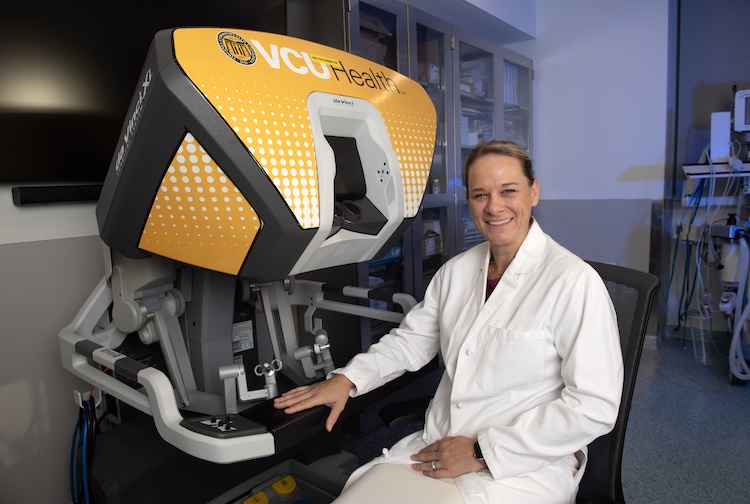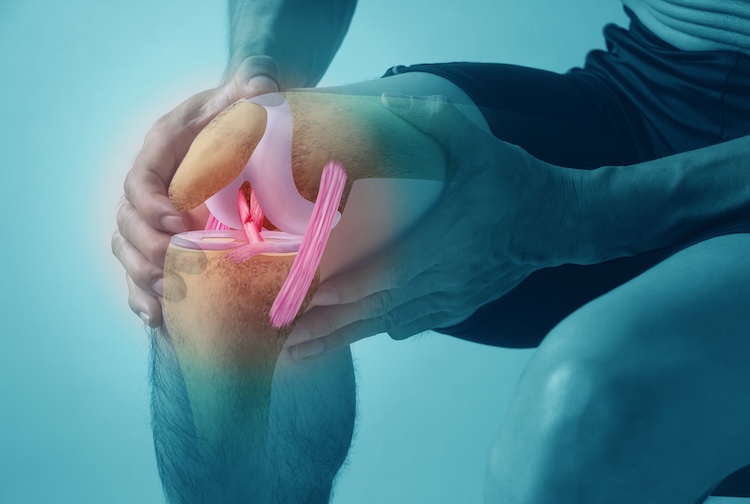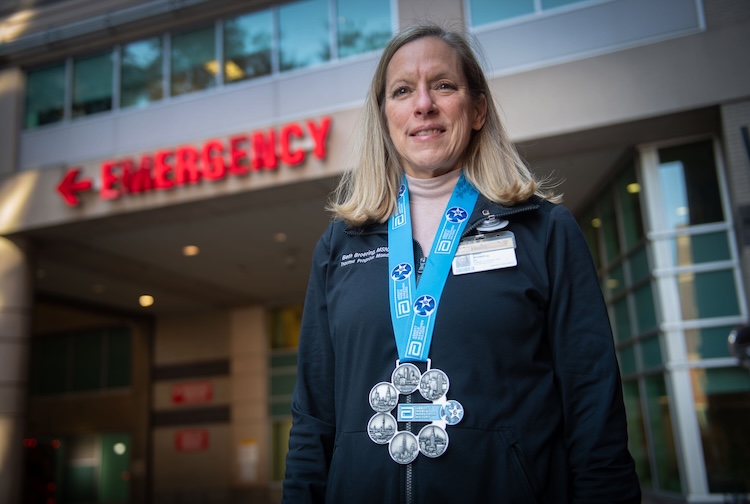'Pushing the boundaries’: Robotic surgery in outpatient settings is giving patients more freedom
VCU Health is expanding robotic surgery services to health care facilities across Central Virginia, allowing patients to get faster care and recover more safely at home.
July 31, 2025 Katherine Cyzczyzon, M.D., co-director of robotic surgery for VCU Health, sits at the console of the da Vinci Surgical System. (Allen Jones, Enterprise Marketing and Communications)
Katherine Cyzczyzon, M.D., co-director of robotic surgery for VCU Health, sits at the console of the da Vinci Surgical System. (Allen Jones, Enterprise Marketing and Communications)
By Leigh Farmer
Health is wealth.
Just ask anyone working in the gig economy. If you miss a day of work – you could be out a lot of money.
Katie Walker knows this all too well. The 30-year-old esthetician relies on a solid client base to remain financially stable. Being out of work six days a month due to her debilitating menstrual cycles hasn’t been good for business.
“It's gotten worse in the last 5 or 6 years,” Katie said. “Ten out of ten pain. Really heavy periods, pain in my back and pain that radiated down into my feet.”
After years of searching for answers, Katie was finally diagnosed with endometriosis, a disease that causes the uterine lining to grow outside of the uterus. About 5 million women in the United States are living with this condition, dealing with debilitating pain during periods, sexual intercourse, bowel movements and urination on top of chronic pelvic pain, bloating, nausea and fatigue.
There is no cure. It’s often treated with birth control and physical therapy.
“The disease itself is really hard to diagnose,” said Katherine Czyszczon, M.D., an OB-GYN and the co-director of robotic surgery for VCU Health. “It is only definitively diagnosed through surgery.”
We are pushing the boundaries of robotic surgery in order for patients to recover faster and safer.
Vigneshwar Kasirajan, M.D., FACS, chair of the Department of Surgery for VCU Health
Czyszczon specializes in minimally invasive gynecologic surgery, but it’s still the last resort when it comes to endometriosis.
“Many patients come in to me after seeing multiple people and not feeling heard or not feeling seen and being dismissed, and just handed a birth control prescription,” said Czyszczon, who is also an assistant professor in the Department of Obstetrics and Gynecology at Virginia Commonwealth University’s School of Medicine.
For years, that’s exactly what happened to Katie. So, by the time she saw Czyszczon, she had a lot of self-doubt.
“I'm just very relieved and thankful that Doctor C. took me seriously enough,” Katie said.
Using robotic technology, Czyszczon was able to remove stage four endometriosis which was found near her bladder, bowels, and ovaries.
"The disease was more advanced than I expected, but it was all within the realm of what I could achieve out there and do very safely,” Czyszczon said.
Despite the severity of the endometriosis, Katie’s surgery wasn’t done at VCU Medical Center. It was done at the VCU Health Short Pump Ambulatory Surgery Center (ASC), an outpatient facility in Henrico County.
The advantages of robotic surgery
Removing endometriosis through robotic surgery has become more common. But Czyszczon remembers when it wasn’t.
“When I was a resident at VCU in the early 2000s, robotics was very new,” she explained. “We had two little robots. Gynecology and urology were the main utilizers.”
Today, robotic surgery is used in the most complex cases at VCU Health. VCU Medical Center utilizes the technology often for transplant and cancer patients.
During robotic surgery, doctors are still in charge, but they sit at a console and look through a viewfinder that provides them with a 3-dimensional view of a person’s anatomy.
“The big advantage is not just small incisions and less pain, it is that you can actually see better in certain areas with the robotic capability,” said Vigneshwar Kasirajan, M.D., FACS, chair of the Department of Surgery for VCU Health. “That's the beauty of it. When you start looking at the narrow spaces inside human body cavities, the robotic camera – with its lighting, visualization, and 3-D optimization – provides vision that's superior to us just being able to look in.”
Kasirajan has been at VCU Health since robotics surgery was introduced in 1999 and has been an integral part of its growth and development. He is amazed at what this technology can do for patient outcomes. “We are pushing the boundaries of robotic surgery in order for patients to recover faster and safer,” he said.
Now VCU Health is moving robotic surgery out of the inpatient setting by offering it to patients who are healthy enough to go home the same day.
In and out the same day with outpatient robotic surgery
At VCU Health’s Short Pump Ambulatory Surgical Center, the da Vinci Surgical System is used to perform procedures such as hernia repairs and gallbladder removal, as well as women’s health and urologic issues.
Katie is an otherwise healthy woman with much to look forward to in her 30s. Despite the severity of her endometriosis, her surgery took less than three hours and she was home shortly after lunch.
“The recovery was really easy,” Katie said.
“I have a large group of patients like that,” Czyszczon said.
 Katie Walker, a VCU Health patient, says she is living pain-free after having robot-assisted surgery to remove endometriosis. (Enterprise Marketing and Communications)
Katie Walker, a VCU Health patient, says she is living pain-free after having robot-assisted surgery to remove endometriosis. (Enterprise Marketing and Communications)
Healthy patients have very little complications to their cases, so their procedures can be done in an outpatient setting. Czyszczon says it takes a discerning surgeon to determine who qualifies for outpatient robotic surgery, but at the Short Pump ASC, they are using the robotic surgery option often.
“There are several benefits the ASC offers compared to traditional hospital settings,” said Bernadette Purser, senior administrator at Short Pump ASC. “Patients are in a comfortable environment, oftentimes closer to home, and enjoy the convenience of not navigating downtown Richmond.”
Aside from the ASC in Short Pump, VCU Health has invested in the opportunity for patients to have robotic surgery in both the inpatient and outpatient settings with robotic surgical suites available at VCU Medical Center, Children’s Hospital of Richmond at VCU and VCU Health Community Memorial Hospital in South Hill, Virginia.
For Katie, the robotic surgery allowed her to heal quickly. She started seeing clients just two weeks after surgery.
The five tiny incisions she has are fading, much like the pain of her endometriosis.
“I’ve had to revolve my schedule around the pain,” Katie said. “I'm hoping that now, I can just have a normal period, maybe take an ibuprofen if I need to."
The relief of finally living pain-free is giving Katie the ability to plan for the future in a way she’s never been able to before. From booking trips to visiting friends, she says now she can “really do anything.”
Get an inside look at VCU Health’s latest innovations in robotic-assisted surgery.




